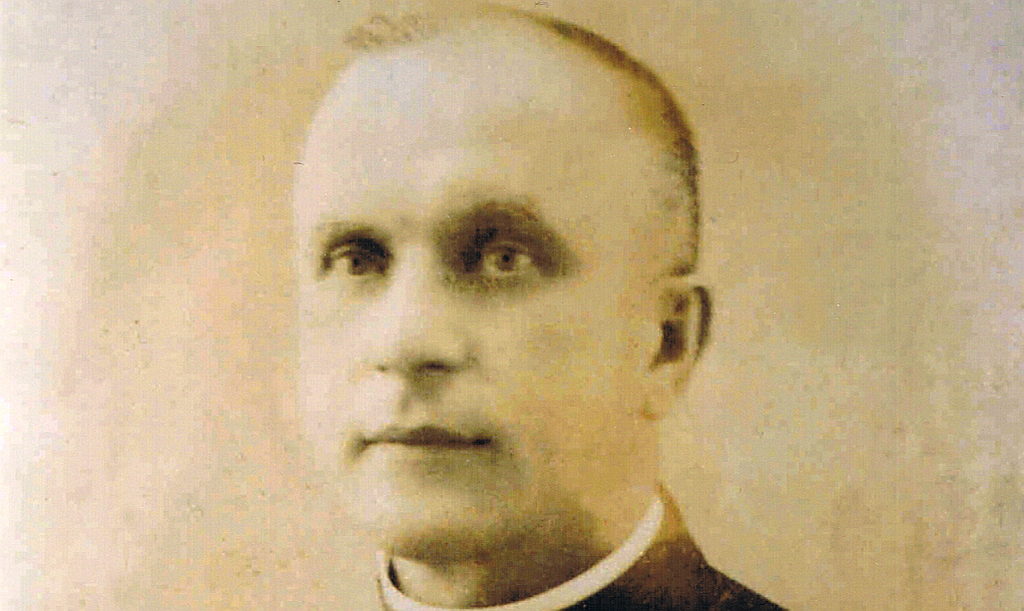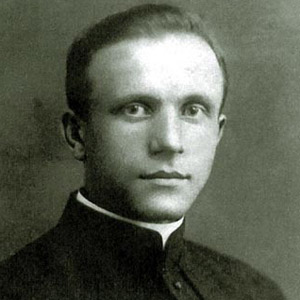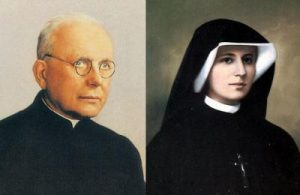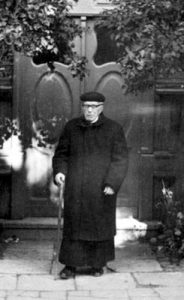
Blessed Michael Sopocko was a priest, professor, theologian, spiritual director, and a conduit for an important divine message for our times. Michael was born at Nowasady, near the city of Vilnius, which was part of Poland, but is now in Lithuania. His parents were of the noble Polish class, but were poor farmers who barely made a living. The family was devout, prayed together daily, and attended Mass at their parish eleven miles away. As a boy, Michael built a small altar at home, where he often prayed. By the time he was a teen, he knew he was called to be a priest. Since his family could not afford to pay for his seminary education, the seminary rector in Vilnius obtained financial help for him to complete his studies.
Ordination and early priesthood in time of war

He was ordained in 1914 at age twenty five. His first four years as a priest were served in a parish near Vilnius. Facing the dark reality of the impending First World War, young Fr. Sopocko experienced the German-Russian front pass through his town and he devoted himself to tending to the citizens wounded by the war. The occupying Germans opposed his work, and in 1918 they forced him to leave. He volunteered to be a military chaplain and requested to be sent to the front lines near Vilnius. In the terrible conditions of a war front, Father became ill, and was sent to an officer training camp. There, his inspirational talks on religion and patriotism were so impressive, they became mandated instruction for all military cadets. He resumed his theology studies at the University of Warsaw, earning his master’s degree in 1923, as well as an advanced degree in education. He also established an orphanage for the children of war casualties there, and earned his doctorate in theology.
A difficult new assignment at Vilnius
The Bishop of Vilnius summoned his talented priest back to Vilnius to serve as director of military chaplaincy for the region, placing ten thousand troops under his care. In 1927, Fr. Sopocko was chosen as the director of the Pastoral Theology department at Stefan Bathory University at Vilnius, as well as spiritual director for the Vilnius seminary, causing him to leave the chaplaincy work. In 1933, he was appointed Confessor at the Convent of the Sisters of Our Lady of Mercy in Vilnius. At this time, there was a young Polish nun there, Sister [St.] Maria Faustina Kowalska, who was receiving some allegedly divine messages and apparitions. Faustina and her superiors did not know what to do about them, so Sr. Faustina had been praying ardently for a wise confessor who could help her. Her previous confessors did not believe her. Fr. Sopocko, knowing the importance of caution when it comes to “private revelation”, did not believe her either – at first. In fact, he requested to be relieved of the duty of serving as confessor at the convent. The Mother Superior, who insisted that Sr. Faustina was a model of virtue, asked him, “Well, what are we supposed to do?”. Father set about to “test the spirits” (1 Jn 4:1-3) to see if the messages were in accord with Church teaching. He also had Sr. Faustina examined by a psychiatrist, who declared her to be of perfectly sound mind. In addition, Sr. Faustina, who had only three years of formal education, was telling him things that she could not possibly have known. In fact, she was revealing a deep understanding of theology, the mystical relationship between God and the human soul, and the importance of God’s attribute of mercy beyond human understanding. After researching the teachings of some of the great Fathers and Doctors of the Church, he recognized the extraordinary gifts Sr. Faustina was receiving and told her to keep a diary of her experiences.
Convinced and resolute

Since Jesus requested that an image be made, Fr. Sopocko commissioned artist Eugene Kazimierowski, who created the first painting of the Divine Mercy image according to the explicit instructions of Sr. Faustina. At Easter of 1935, Father agreed to preach at the beautiful Vilnius Ostra Brama (city gate) if the painted image was displayed, making this the first time the message and image of Divine Mercy were presented. After Sr. Faustina’s death in 1939, Father worked tirelessly to spread the message, printing pamphlets and prayer cards of the Divine Mercy image, Novena, and Chaplet. He gave the manuscript of the diary to Fr. Joseph Jarzebowski of the Marians of the Immaculate Conception in order to get it out of the dire situation in Poland and to safety in the United States. The story of the Fr. Jarzebowski’s perilous 1941 journey through the Soviet Union, Siberia, Japan and on to the United States is filled with wonders of Divine Providence, but the manuscript was delivered safely to the Marians in Massachusetts. During World War II in Vilnius, Fr. Sopocko continued his work on behalf of the Divine Mercy message and assisted Jewish refugees from Poland. He was arrested and briefly jailed by the Gestapo. In the spring of 1942, they began to arrest all priests in Vilnius for transfer to concentration camps, but because he was forewarned, Father hid in an Ursuline convent, working as a gardener and handyman under a false name. After the war, he returned to Poland, where he taught at the Bialystok seminary. In 1962, an injury caused him to retire from most of his responsibilities. He published a four-volume work entitled The Mercy of God in His Works. Although the faulty translation of the diary caused the entire Divine Mercy message to be banned until after Father’s death, he was encouraged that the Archbishop of Krakow, Karol Wojtyla (future Pope St. John Paul II), had begun an official investigation in 1965 of Sr. Faustina’s life. Fr. Sopocko died February 15, 1975 at Bialystok at age eighty-six.

Divine Mercy message spread
Once Bl. Michael Sopocko became convinced of the authenticity and importance of the Divine Mercy message, he devoted the remainder of his life to its promotion. Even though he was grieved because of the ban, he was never discouraged. When the ban was lifted in 1978, the cause for Sr. Faustina’s eventual canonization and the Divine Mercy message proceeded. Fr. Sopocko was her mentor and spiritual guide, and because of his request for her to record her experiences, we have the benefit of a message of mercy sorely needed in our time. He was a gifted theologian, but because of the many years of suffering, violence, and deprivation he experienced, Father had a compassionate heart. In 2004, Father was declared “venerable”, and was beatified in 2008. His feast day is February 15.
